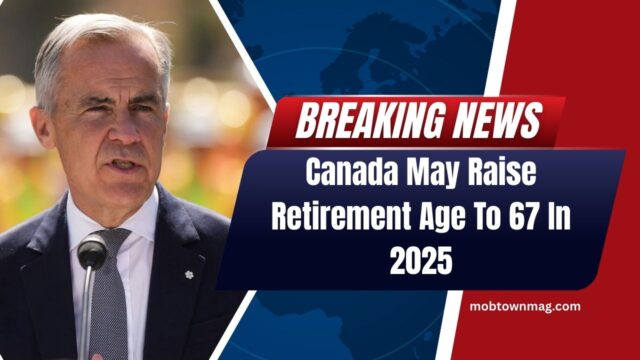In 2025, Canada is seeing one of its biggest debates on retirement age, pension rules, and early withdrawal options.
With living costs rising, people living longer, and more Canadians relying on the Canada Pension Plan (CPP) and Old Age Security (OAS), the government is under pressure to update the rules.
Many believe the system should be more flexible, while others worry that changes could put a strain on public funds. This discussion will affect millions of seniors and those planning for retirement in the future.
Why Is Canada Reviewing Retirement Age in 2025?
The push for a review is coming from several key factors:
- Demographic Pressure – By 2030, over 20% of Canadians will be aged 65 and above, increasing demand on pension funds.
- Longevity Trends – People are living longer, which means they need income for more years.
- Rising Cost of Living – Inflation and housing costs are forcing many seniors to work past 65.
- Sustainability of CPP & OAS – Concerns that pension funds may not be able to handle future demand.
These issues have made 2025 a turning point in how Canada might handle retirement planning.
Current Retirement Age and Pension Rules
At present:
- Standard Retirement Age: 65 years
- Early Retirement: Allowed from age 60 with reduced benefits
- Deferring Benefits: Possible until age 70 with increased payments
This system is now being questioned as Canada looks for ways to balance financial sustainability with fairness.
Proposals for 2025 Retirement Age Reform
Several proposals are under review by federal and provincial governments:
| Policy Proposal | Current Status | Proposed Change | Impacted Group |
|---|---|---|---|
| Retirement Age | 65 | Gradual increase to 67 by 2030 | Workers under 60 |
| Partial Pension Withdrawal | From age 60 | Flexible with part-time work options | Early retirees |
| CPP Contribution for High-Income Earners | Standard rate | Increased rates | High earners |
| Pension Deferral Bonuses | Optional | More incentives for late retirement | Seniors retiring after 65 |
| Tax Credits for Working Seniors | Limited | Expanded credits | Workers aged 65+ |
How Will This Affect Seniors?
These reforms could have different impacts depending on your situation:
- Age 60–64: You might need to wait longer for full benefits, or accept lower early payouts.
- Current Retirees: No immediate changes, but future rules could affect inflation adjustments or benefit amounts.
- Younger Workers: May face a higher retirement age and increased CPP contributions.
A major concern is that raising the retirement age could unfairly affect those in physically demanding jobs who cannot easily work longer.
Political & Public Reaction
- Political Divide: Some parties support raising the retirement age to protect pension sustainability, while others oppose delaying access to benefits.
- Seniors’ Advocacy Groups: The Canadian Association of Retired Persons (CARP) warns against reforms that hurt low-income seniors.
- Urban vs Rural Views: Urban professionals are more open to working longer, but rural and blue-collar workers strongly resist.
Why Early Withdrawal Rules Matter
Many Canadians depend on early retirement options to manage personal and family needs. Partial pension withdrawals with part-time work could be a solution, allowing financial support without fully leaving the workforce.
What’s Next for Retirement in Canada
The Canada retirement age debate in 2025 is about more than just numbers—it’s about quality of life, economic stability, and future planning.
No official changes have been made yet, but updates to pension withdrawal policy are expected to be announced in the coming years. Staying informed now can help you make smarter retirement decisions later.
With Canadians living longer and facing higher costs, the debate over retirement age and pension rules will remain a hot topic.
Whether changes involve raising the age to 67, offering flexible early withdrawal, or adjusting CPP contributions, these reforms will shape how future generations plan for financial security. The coming years will reveal if Canada chooses gradual reform or keeps its current system.
FAQs
What is the current retirement age in Canada?
The standard retirement age is 65, but you can start from 60 with a reduced pension or defer up to 70 for higher payments.
Will current pensioners be affected by the 2025 reforms?
No immediate changes are expected for current retirees, but future benefit adjustments could impact inflation-linked increases.
Why is Canada considering raising the retirement age?
To address longer life expectancy, rising costs, and pressure on public pension funds, ensuring the system stays sustainable.




